Table of Contents
The world is a big place. But at the end of the day, all we have control over is our own little corner of it, which begins with the self.
There is no arguing that we live in an unfree world. However, we can carve out our own space of freedom within it. Personal autonomy is absolutely crucial for anyone seeking to make a free life for themselves in a world where personal freedom is hemmed in on all sides from both state and private institutions.
Everyone worth their salt wants to be free. The question is how we go about doing this in a world where it is so difficult. In the hardest of situations, it can be helpful to simply know that others have confronted the same challenges as you and have overcome them.
Mastery of the self begins with controlling one’s emotions. When we are a slave to our emotions how can we ever be otherwise free? Again: The world around us is largely out of our control, but we can control ourselves. The only way to do this properly is by controlling our emotions.
All of this is easier said than done. But perhaps these quotes will help you to see the path forward when nothing else will.
Quotes About Autonomy and Self Rule
Johann Wolfgang von Goethe
“He alone is great and happy, who requires neither to command nor to obey, in order to secure his being of some importance in the world.”
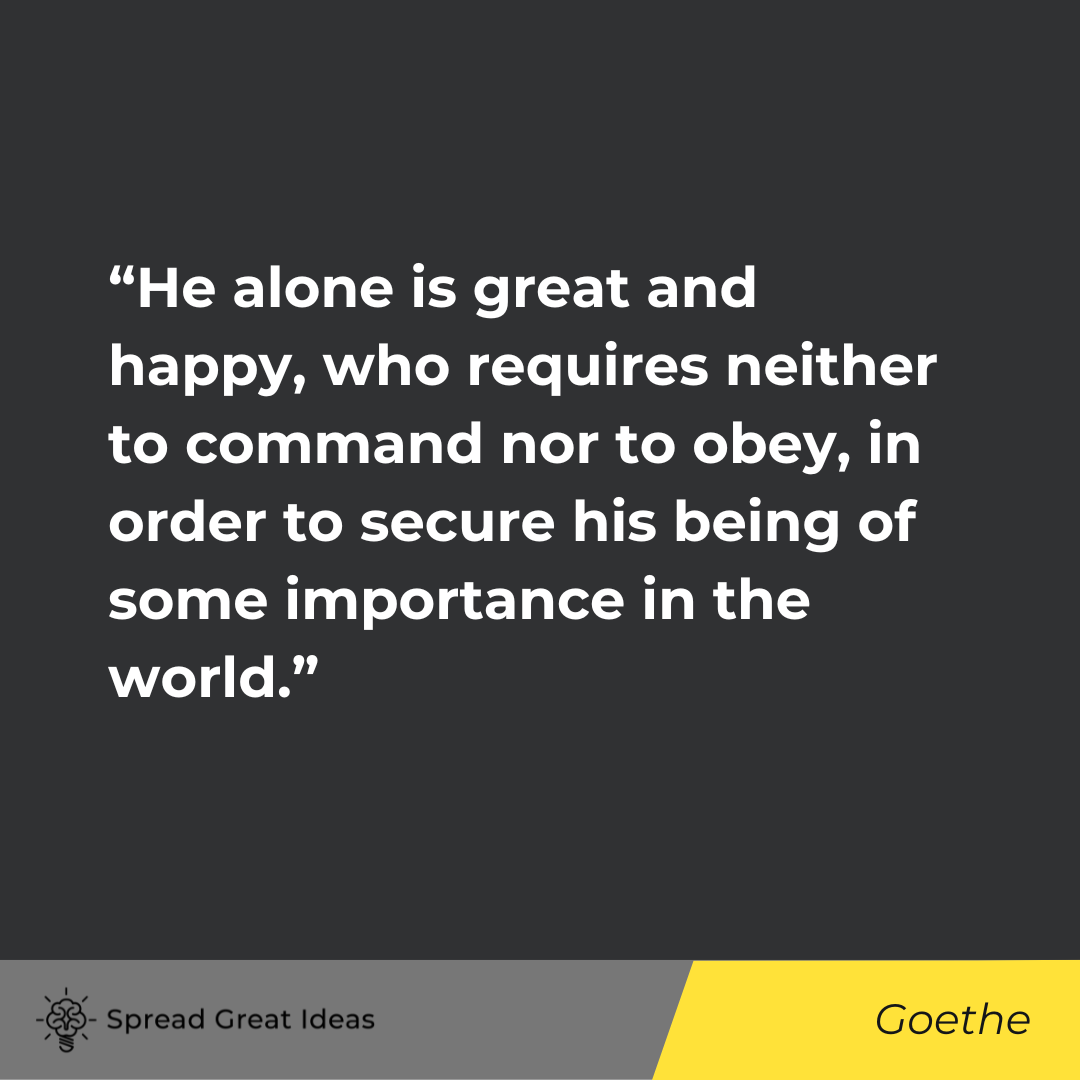
Johann Wolfgang von Goethe’s quote encapsulates the notion of true greatness and happiness stemming from independence and self-reliance. He suggests that individuals who do not feel the need to either command others or submit to authority in order to assert their significance are the ones who truly embody greatness and contentment. This quote highlights the value of autonomy and self-sufficiency in defining one’s sense of importance and fulfillment, rather than relying on external power dynamics. Goethe’s perspective invites reflection on the intrinsic worth of personal agency and freedom from the constraints of social hierarchies.
Wendy McElroy
“Every human being has a fundamental obligation to determine what is just and then to act according to his or her conscience, even if it contradicts the majority or the law. One’s moral conscience is what makes someone fully human.”
– Wendy McElroy, paraphrasing Henry David Thoreau
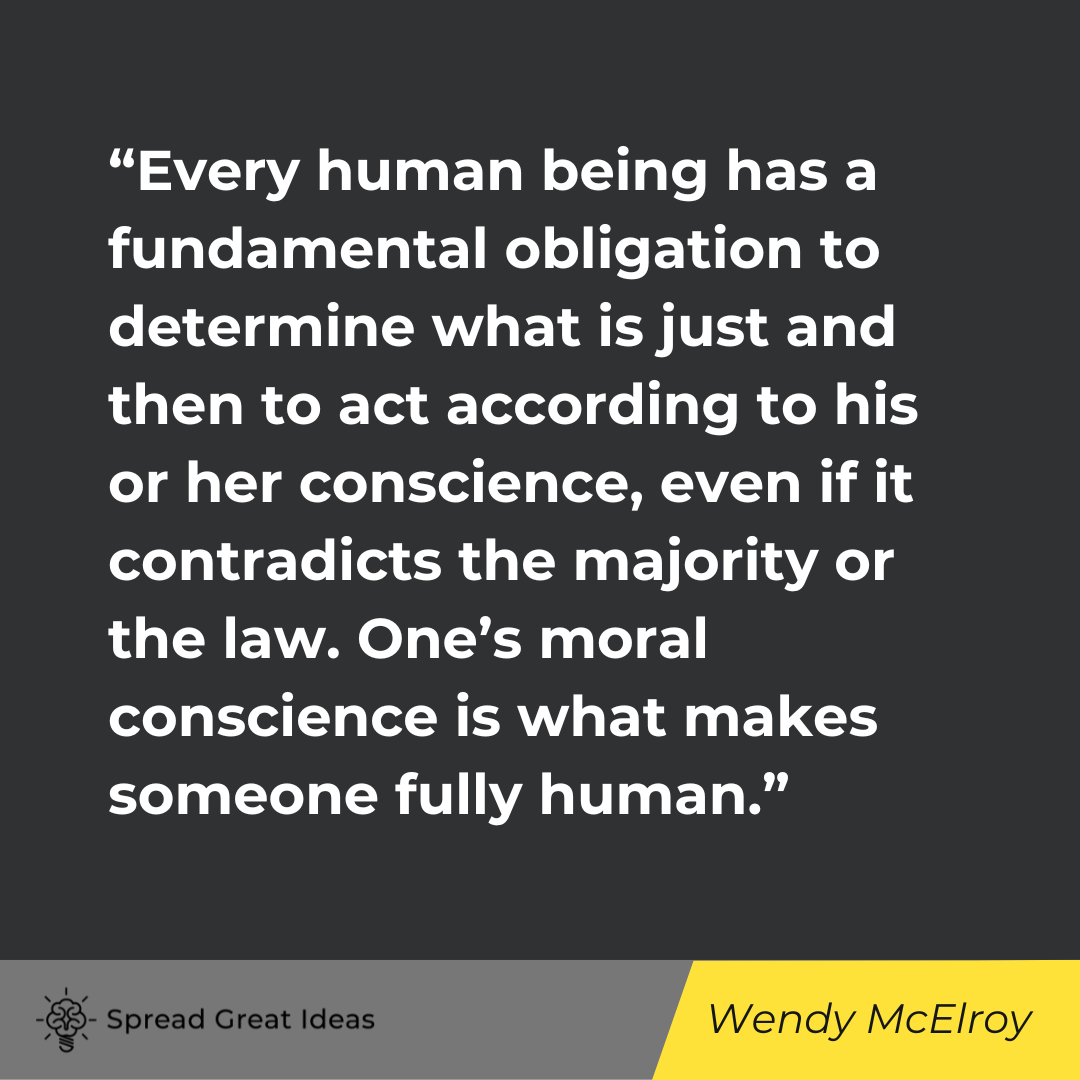
Wendy McElroy, paraphrasing Henry David Thoreau, underscores the intrinsic importance of moral conscience in human existence. She asserts that individuals possess a fundamental duty to discern what is just and to act accordingly, even if it means diverging from societal norms or legal statutes. According to McElroy, embracing one’s moral conscience is essential for realizing one’s full humanity, as it reflects an innate capacity for ethical discernment and principled action. This quote highlights the significance of moral autonomy and the imperative to uphold ethical values, even in the face of opposition or dissent.
Henry David Thoreau
“I was not born to be forced. I will breathe after my own fashion. Let us see who is the strongest.”
– Henry David Thoreau, On the Duty of Civil Disobedience
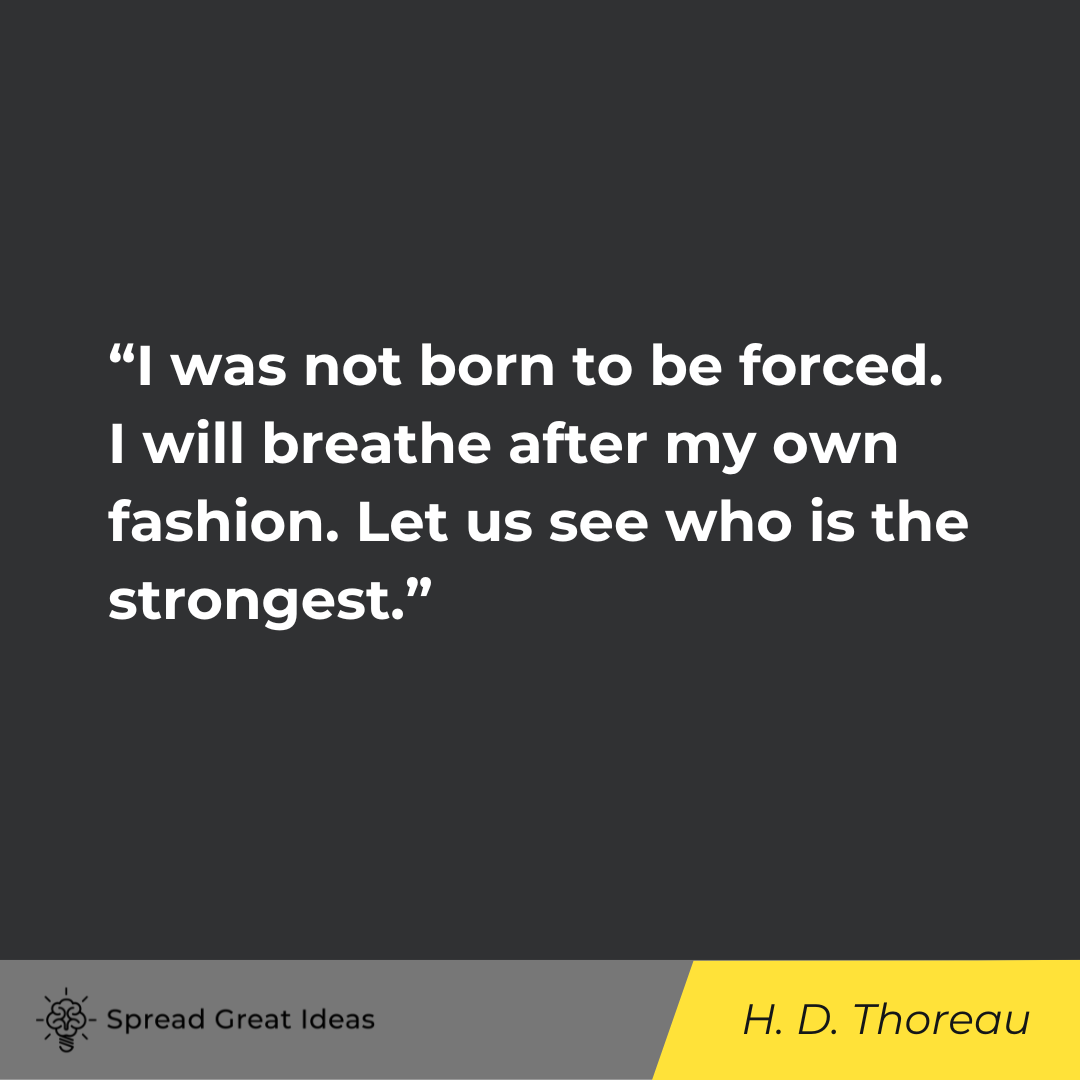
Henry David Thoreau’s quote captures the essence of individualism and resistance against coercion. He asserts his inherent right to live according to his own principles and convictions, refusing to be compelled by external forces. Thoreau’s defiance reflects a commitment to personal autonomy and self-determination, as well as a willingness to challenge authority in pursuit of freedom. This quote embodies the spirit of civil disobedience and the assertion of individual sovereignty, inviting reflection on the power dynamics between individuals and institutions in society.
Ernst Jünger
“A basic theme for the anarch is how man, left to his own devices, can defy superior forces – whether state, society, or the elements – by making use of their rules without submitting to them.”
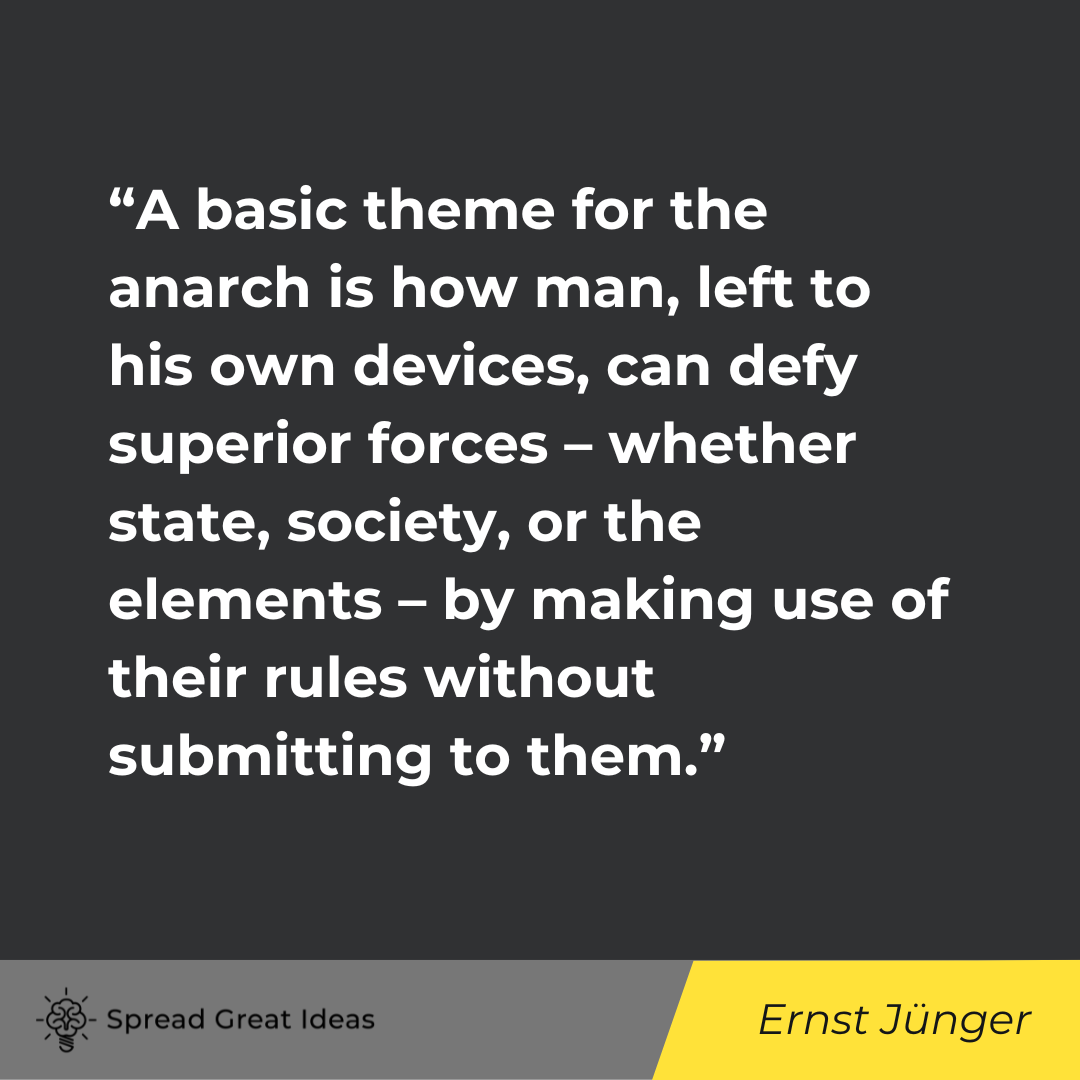
Ernst Jünger’s quote encapsulates the essence of anarchism as a philosophy of individual autonomy and defiance against authority. He explores the concept of the “anarch,” who navigates existence by leveraging established systems and rules to resist domination by superior forces, whether they be governmental, societal, or natural. Jünger’s perspective highlights the potential for individuals to assert their independence and agency within structured frameworks, challenging conventional power structures without succumbing to them. This quote invites contemplation on the nuanced relationship between freedom and constraint, and the ways in which individuals can assert their sovereignty in the face of external pressures.
Phil Craig
“Since 1945, almost every single conflict around the world has its source in the denial of self-determination… It’s not people looking to assert their right to self-determination that’s the problem; it’s when countries deny people the right to live out their existence as they see fit where problems start.”
– Phil Craig, Leader of the South African Referendum Party
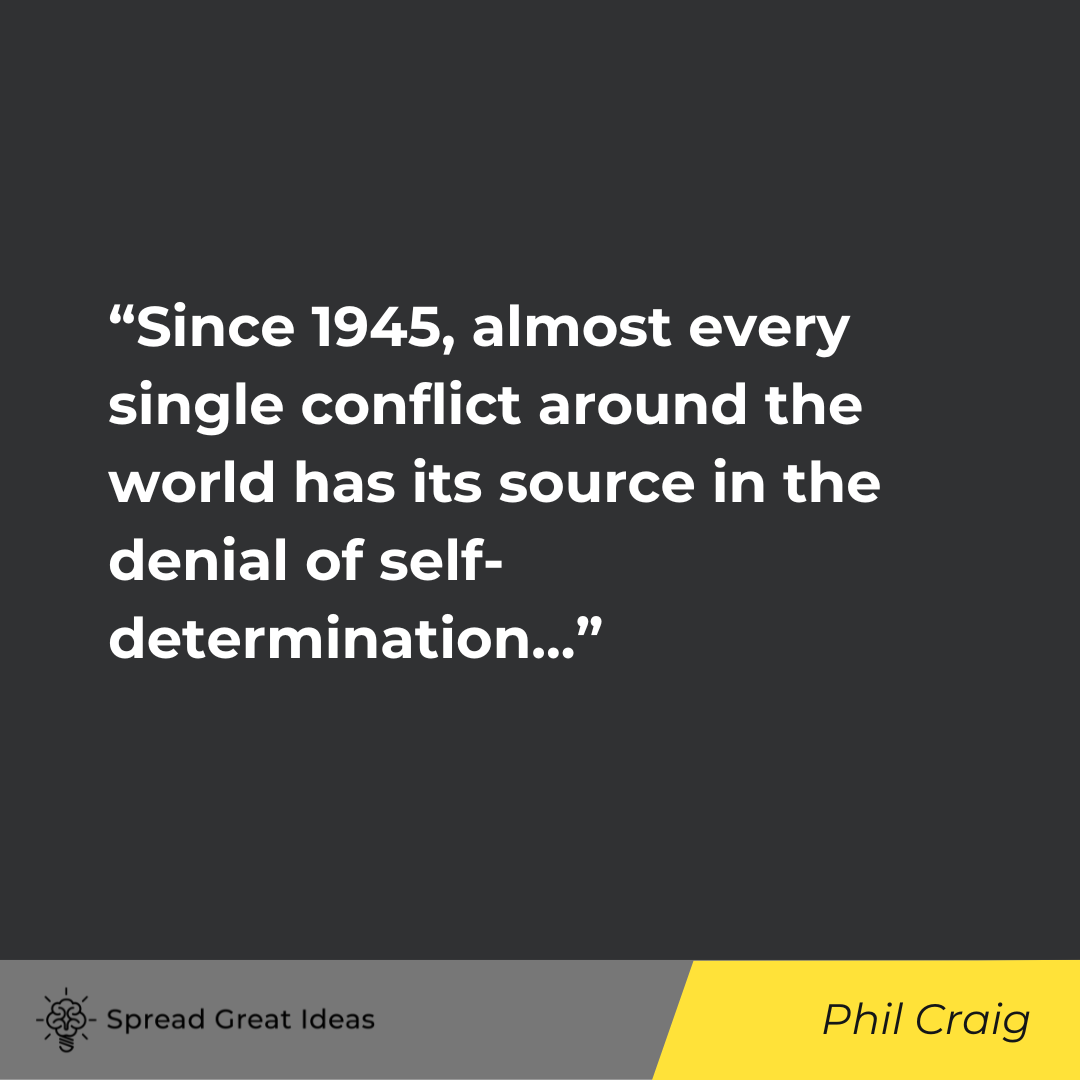
Phil Craig’s quote highlights the critical role of self-determination in global conflicts since 1945. He argues that many conflicts stem from the denial of individuals or groups’ right to determine their own destiny. According to Craig, the root cause of these conflicts lies in countries’ refusal to acknowledge people’s inherent right to live according to their own beliefs and desires. This quote underscores the significance of respecting self-determination as a fundamental principle for fostering peace and stability worldwide. Craig’s perspective prompts reflection on the complex interplay between autonomy, governance, and conflict resolution in contemporary geopolitics.
Ernst Jünger
“‘It is strange,’ Sir William Parry wrote when describing the igloos on Winter Island, ‘it is strange to think that all these measure are taken against the cold – and in houses of ice.’”
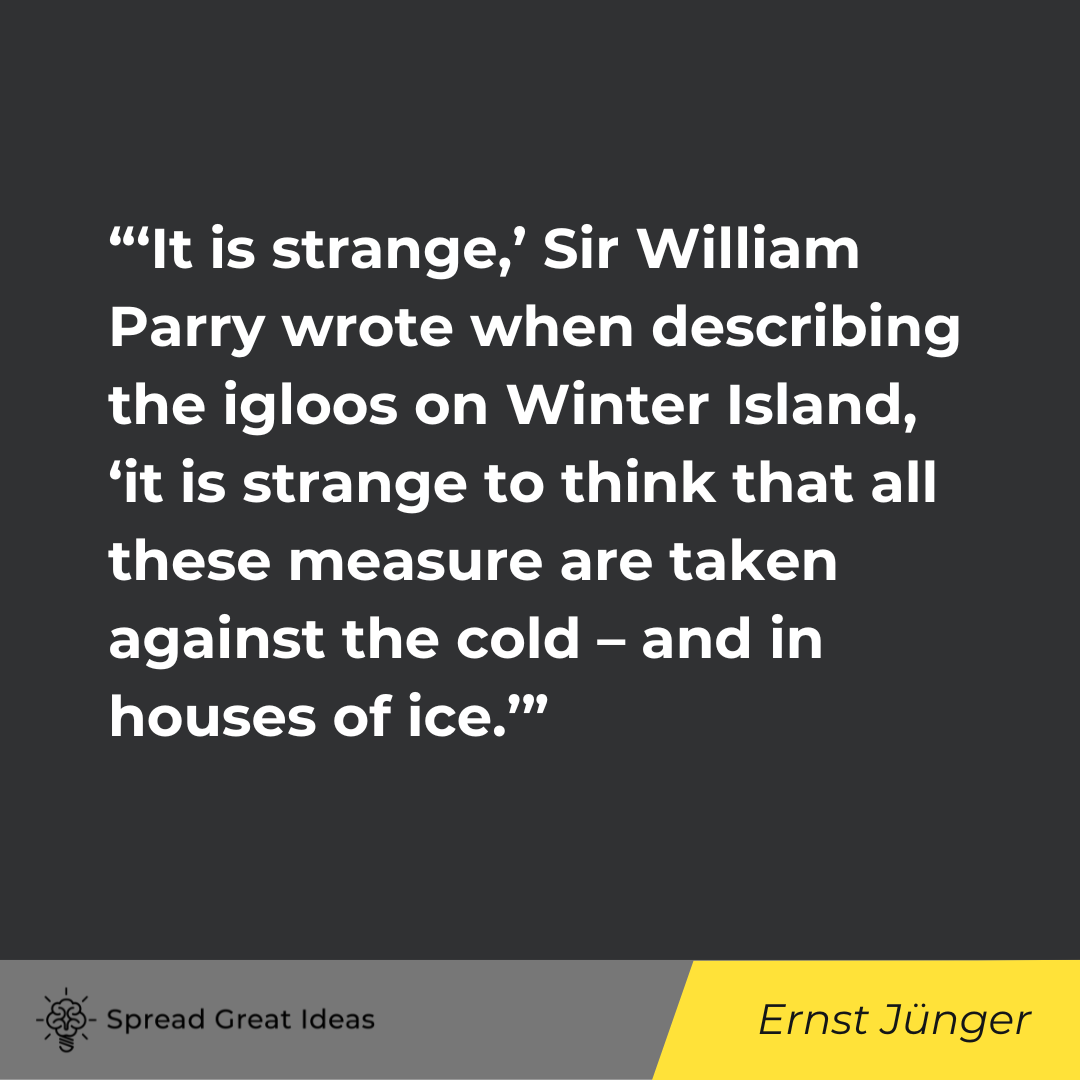
Ernst Jünger’s quote, as expressed through Sir William Parry’s observation, encapsulates the paradox of human adaptation to extreme environments. Parry marvels at the ingenuity of constructing igloos, structures made of ice, to combat the cold. The juxtaposition of using frozen elements to shield against their own harshness underscores humanity’s resilience and resourcefulness in the face of adversity. Jünger, through Parry’s reflection, invites contemplation on the ironies of human existence and our capacity to adapt and thrive amidst challenging conditions.
Muhammad Ali
“I don’t have to be what you want me to be. I’m free to be who I wanna be and think what I wanna think.”
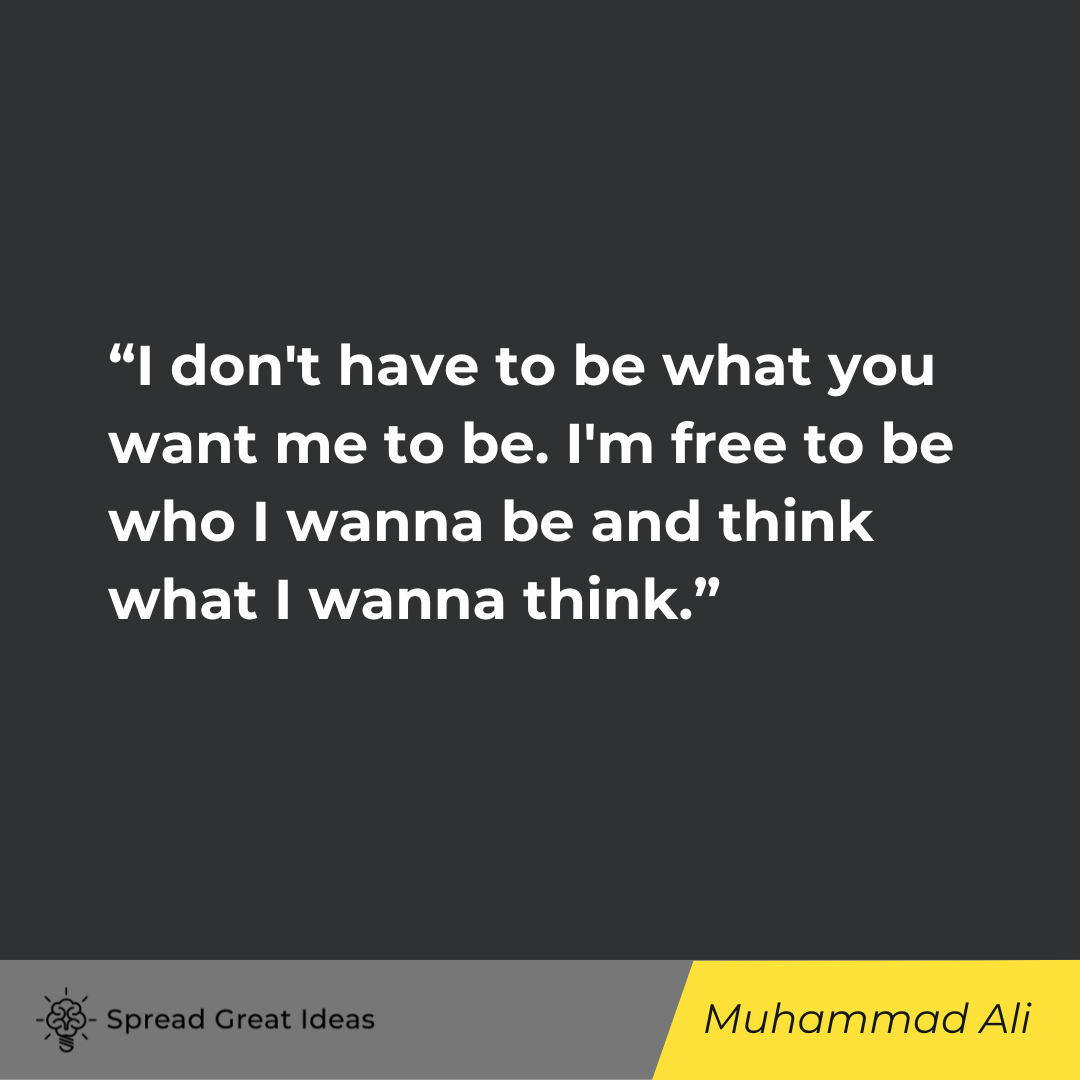
Muhammad Ali’s quote epitomizes the essence of personal freedom and self-determination. With resolute defiance, Ali asserts his autonomy and rejects societal expectations or demands to conform. He embraces the liberty to define himself and to hold his own beliefs without constraint. Ali’s words resonate as a powerful declaration of individual sovereignty, encouraging others to embrace their inherent right to shape their identities and perspectives according to their own desires and convictions.
Charlie Chaplin
“As for politics, I’m an anarchist. I hate governments and rules and fetters. Can’t stand caged animals. People must be free.”
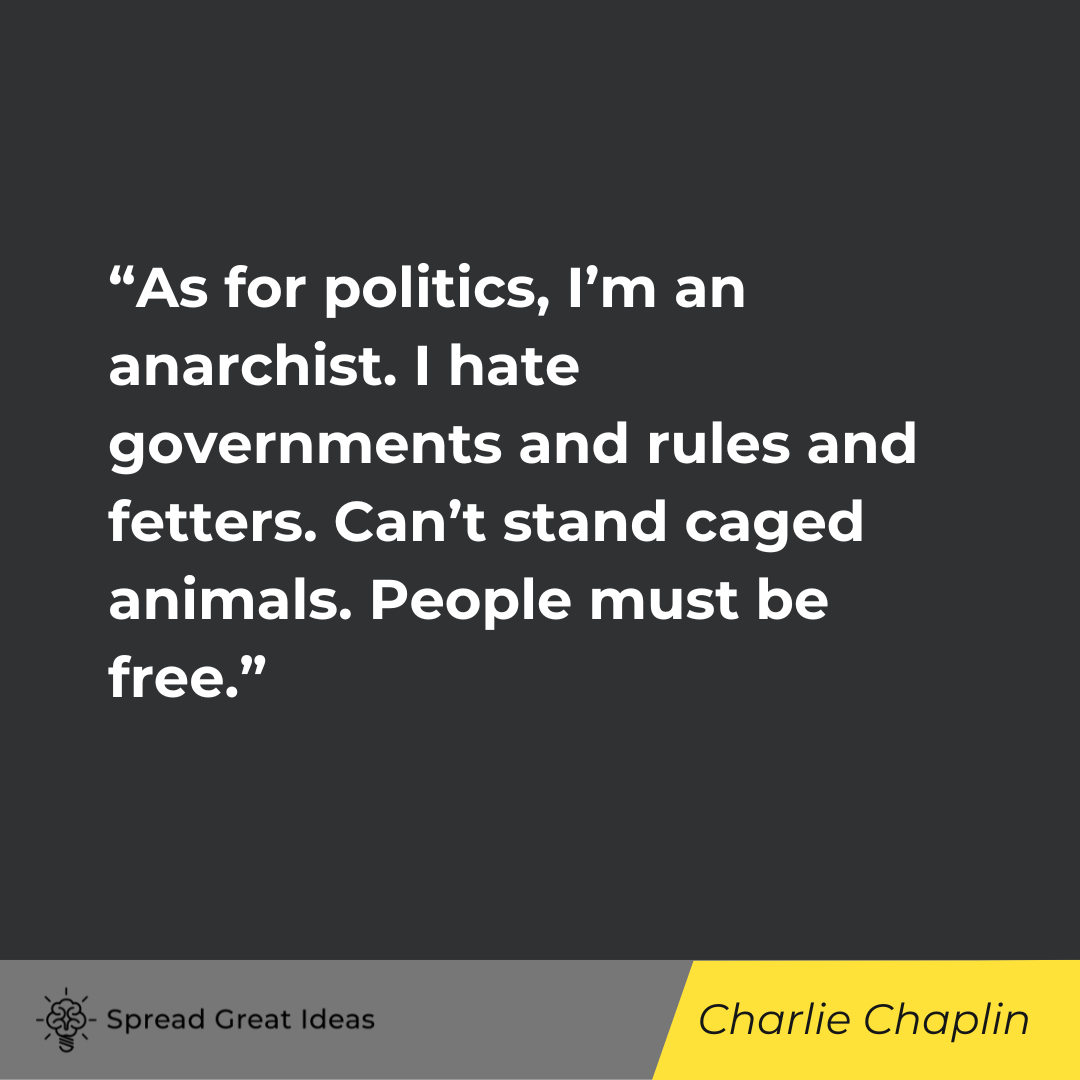
Charlie Chaplin’s quote succinctly captures his anarchist beliefs and his disdain for oppressive governance. He expresses a deep-seated aversion towards the constraints imposed by governments and rules, likening them to cages that confine individual freedom. Chaplin’s declaration reflects a fervent commitment to the ideal of personal liberty, advocating for the inherent right of people to live unrestrained and self-directed lives. Through his words, Chaplin champions the fundamental principle of freedom as essential for human flourishing and fulfillment.
William Penn
“Wear none of thine own chains; but keep free, whilst thou art free.”
– William Penn, “Some Fruits of Solitude,” 1693
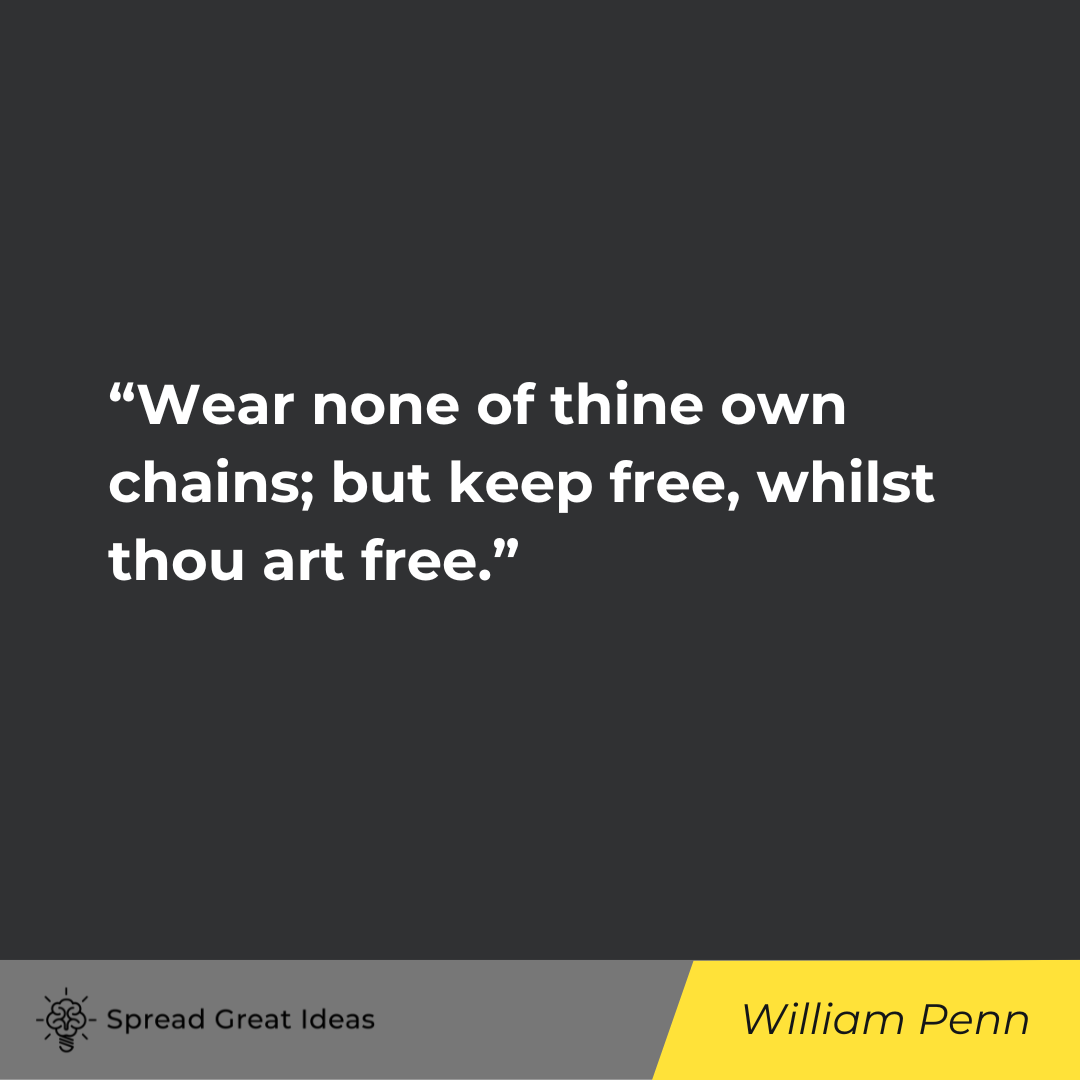
William Penn’s quote from “Some Fruits of Solitude” emphasizes the importance of personal liberation and autonomy. He advises against succumbing to self-imposed limitations, urging individuals to reject the figurative “chains” they may unwittingly bind themselves with. Penn encourages the preservation of personal freedom and the conscious effort to remain unrestrained while one still possesses freedom. This quote serves as a timeless reminder to safeguard one’s autonomy and resist anything that encroaches upon it, emphasizing the value of living life with unfettered liberty.
Davy Crockett
“I bark at no man’s bid. I will never come and go, and fetch and carry, at the whistle of the great man in the White House no matter who he is.”
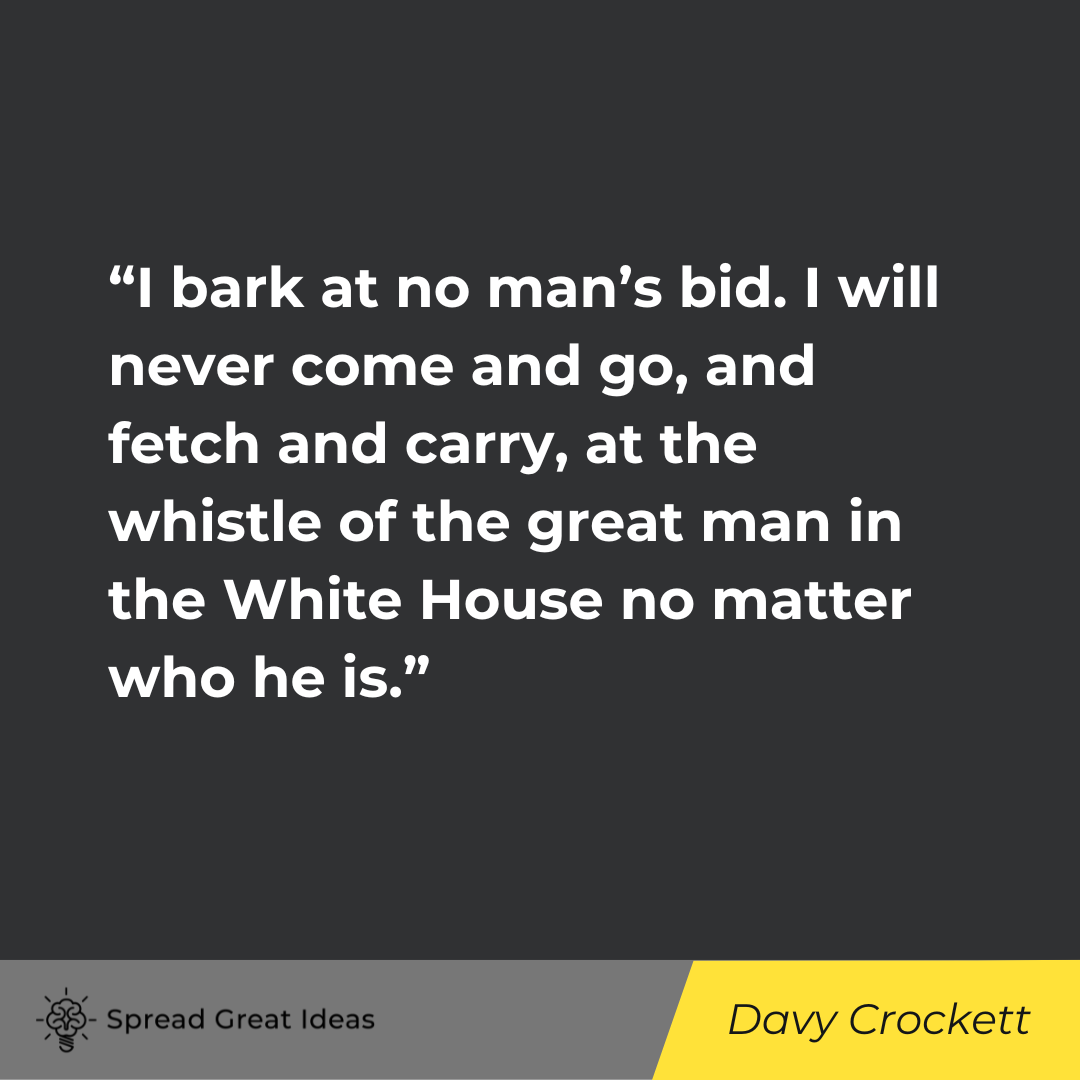
Davy Crockett’s quote encapsulates his fierce independence and refusal to be subservient to authority. He staunchly declares his autonomy, vowing not to blindly obey the directives of any powerful figure, including the President. Crockett’s words reflect a commitment to personal integrity and self-determination, prioritizing individual agency over deference to hierarchical power structures. This quote resonates as a defiant assertion of freedom and individual sovereignty, echoing Crockett’s unwavering resolve to chart his own course in life.
Lao Tzu
“Knowing others is intelligence;
knowing yourself is true wisdom.
Mastering others is strength;
mastering yourself is true power.”
– Lao Tzu
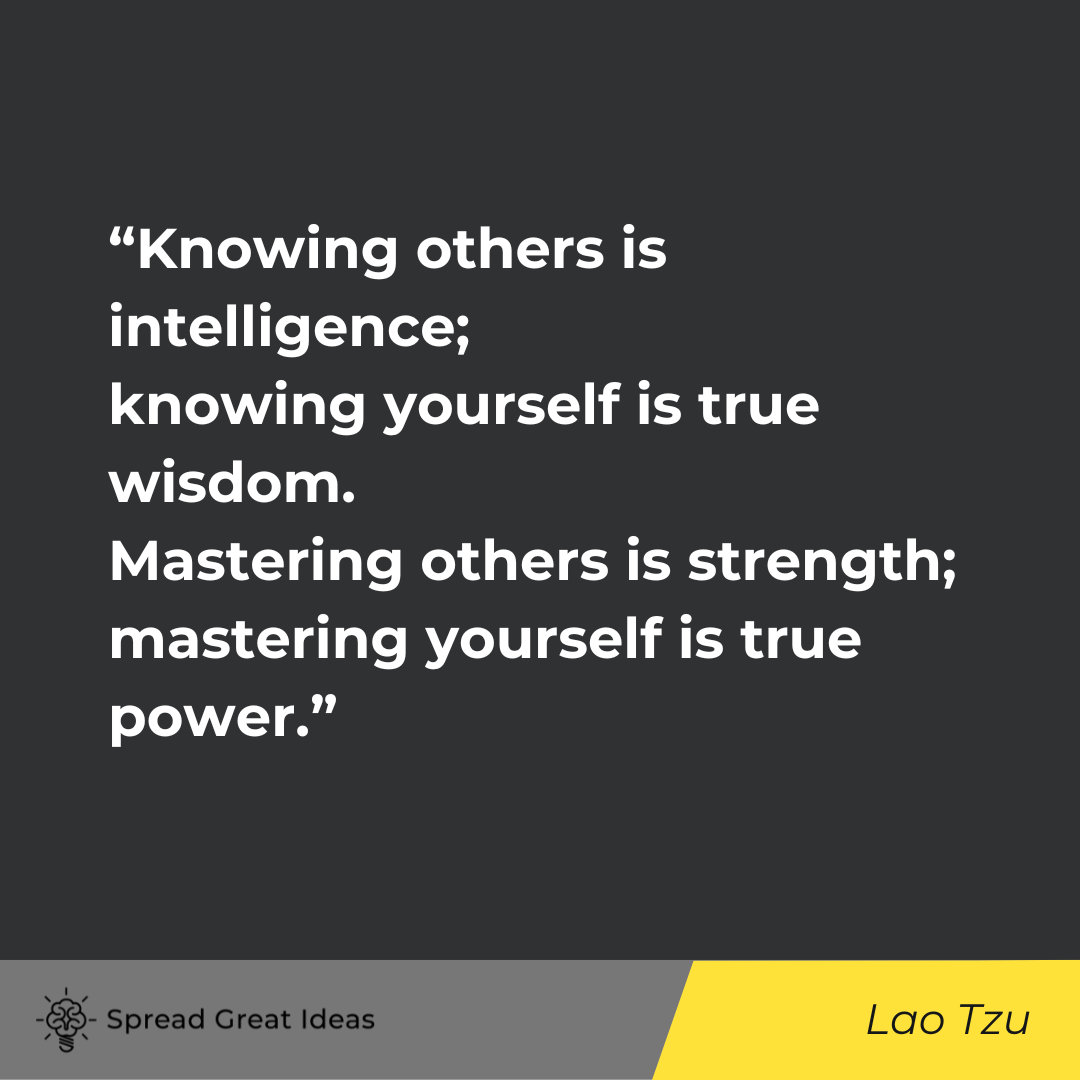
Lao Tzu’s quote succinctly captures the essence of wisdom and personal mastery. He delineates between external knowledge and inner understanding, asserting that true wisdom lies in self-awareness rather than merely understanding others. Additionally, Lao Tzu contrasts the notion of exerting control over others with the more profound achievement of mastering oneself. This quote serves as a timeless reminder of the importance of introspection, self-discipline, and inner strength in the pursuit of genuine enlightenment and empowerment.
George Carlin
“I have always viewed [this culture] from a safe distance, knowing I don’t belong; it doesn’t include me, and it never has. No matter how you care to define it, I do not identify with the local group. Planet, species, race, nation, state, religion, party, union, club, association, neighborhood, improvement committee; I have no interest in any of it. I love and treasure individuals as I meet them, I loathe and despise the groups they identify with and belong to.”
– George Carlin, Brain Droppings
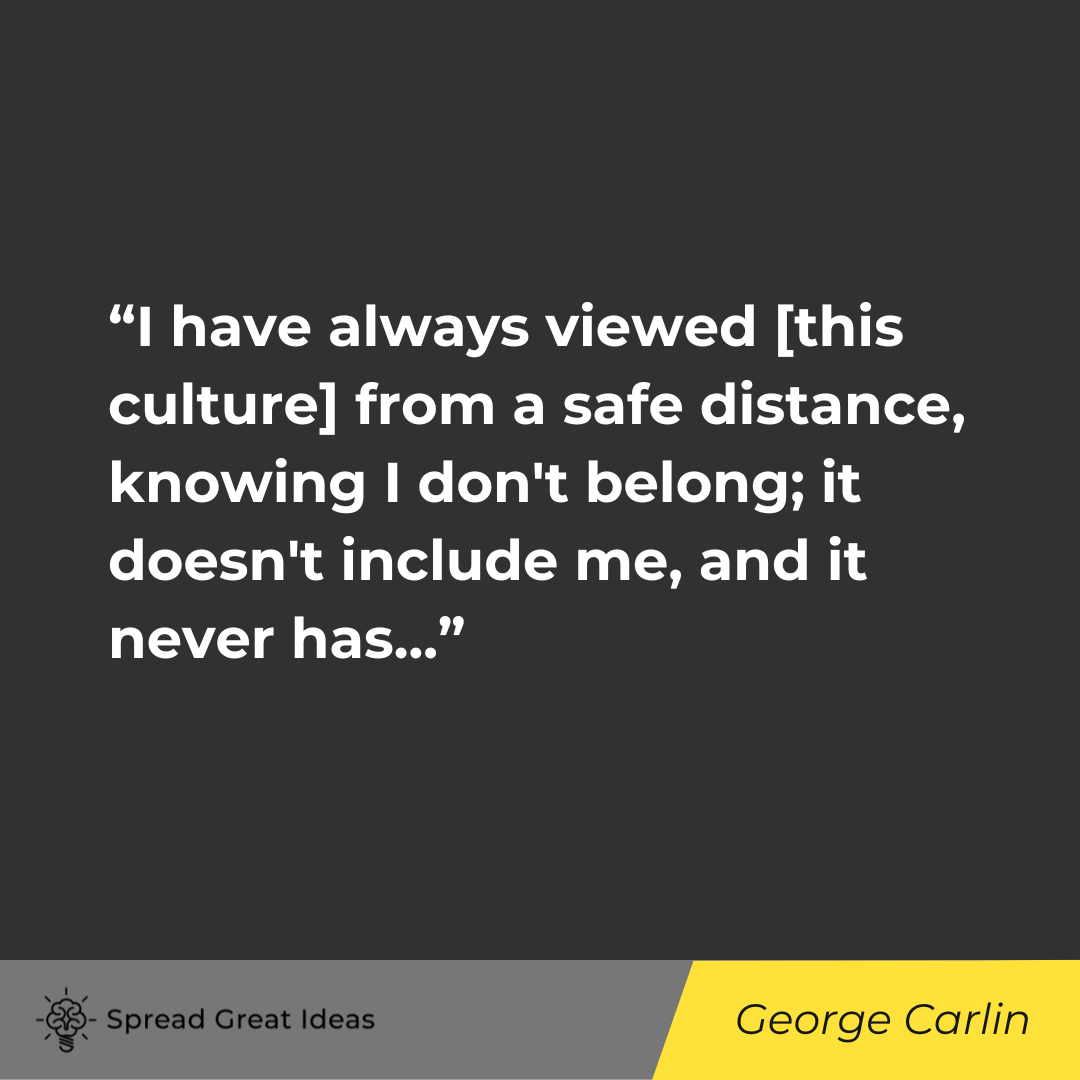
In this quote, George Carlin candidly expresses his detachment from societal affiliations and group identities, highlighting his preference for individual connections over collective labels. He distances himself from various societal constructs, asserting that he does not identify with any group or organization. Carlin’s words reflect a sense of disillusionment with societal norms and a commitment to valuing people as individuals rather than categorizing them based on their affiliations. This quote encapsulates Carlin’s contrarian perspective and his skepticism towards conventional social structures.
Marlon Brando
“There’s a line in the picture where he snarls, ‘Nobody tells me what to do.’ That’s exactly how I’ve felt all my life.”
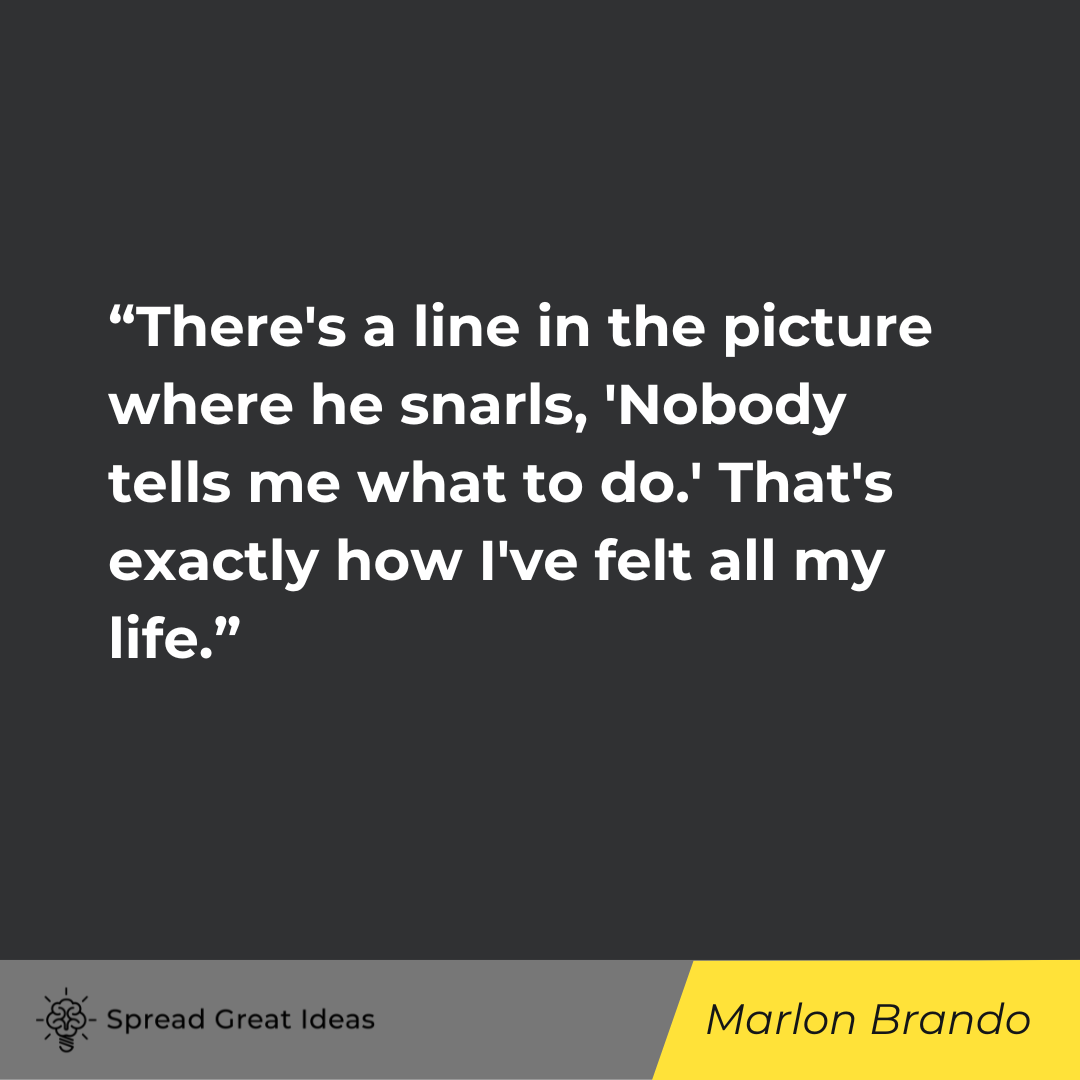
Marlon Brando’s quote encapsulates his fiercely independent spirit and resistance to external influence. He identifies with a character in a film who defiantly declares autonomy, mirroring Brando’s own lifelong assertion of personal freedom. This quote reflects Brando’s commitment to self-determination and refusal to conform to others’ expectations or directives. It embodies his reputation as a rebellious figure in both his personal life and career, emphasizing his unwavering insistence on living by his own rules.
Walt Whitman
“Not I, nor anyone else can travel that road for you.
You must travel it by yourself.
It is not far. It is within reach.
Perhaps you have been on it since you were born, and did not know.
Perhaps it is everywhere – on water and land.”
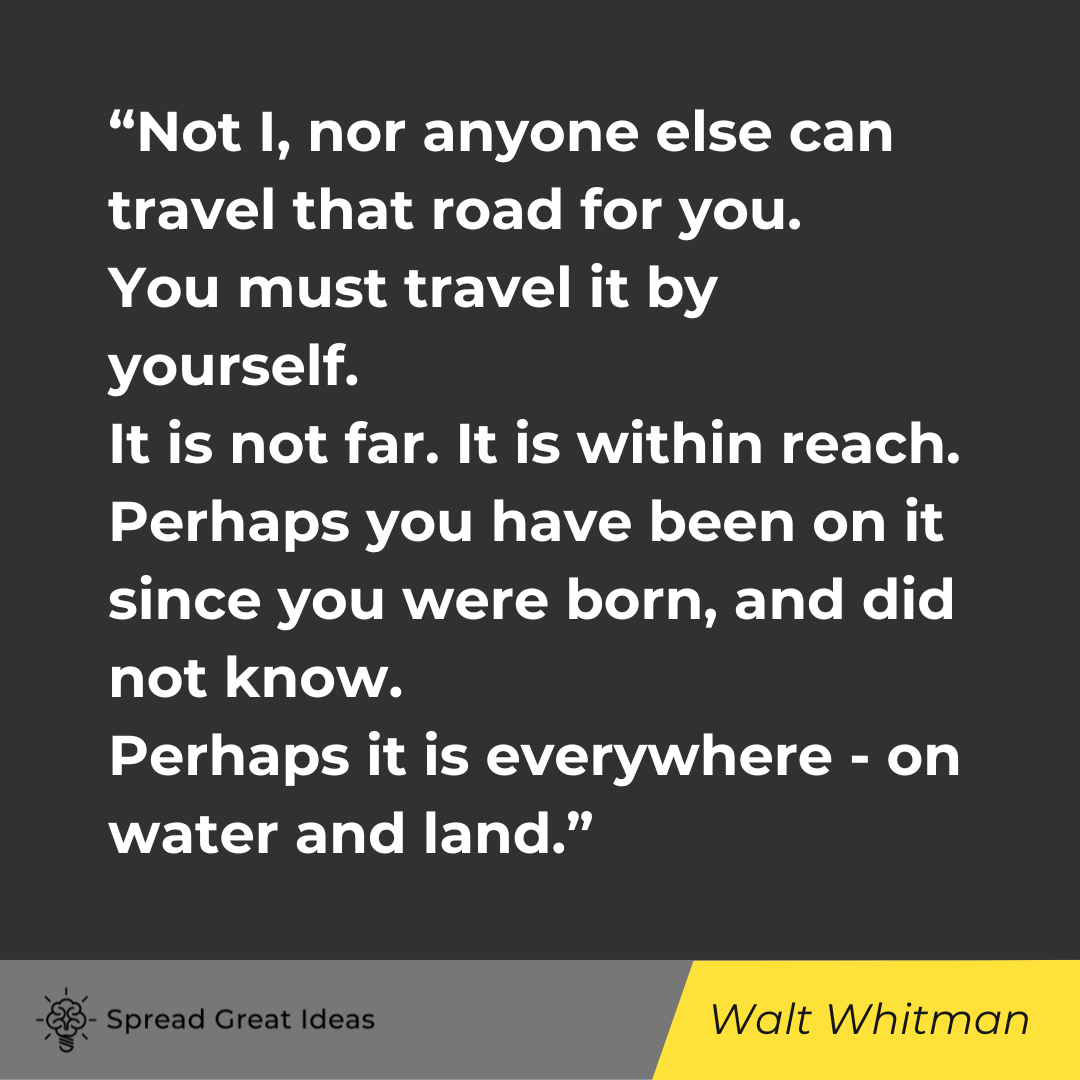
Walt Whitman’s quote emphasizes the individual journey of self-discovery and personal growth. He underscores the idea that each person must navigate their own path in life, highlighting the inherent responsibility and agency of the individual. Whitman suggests that this journey is not distant or unattainable but is instead accessible to everyone, perhaps existing within them from birth. He evokes a sense of universality, suggesting that this journey is omnipresent, permeating every aspect of existence. Ultimately, Whitman’s words inspire self-reflection and encourage readers to embrace their own unique journey of self-realization and exploration.
Patrick Henry
“Is life so dear, or peace so sweet, as to be purchased at the price of chains and slavery? Forbid it, Almighty God! I know not what course others may take, but as for me, give me liberty or give me death!”
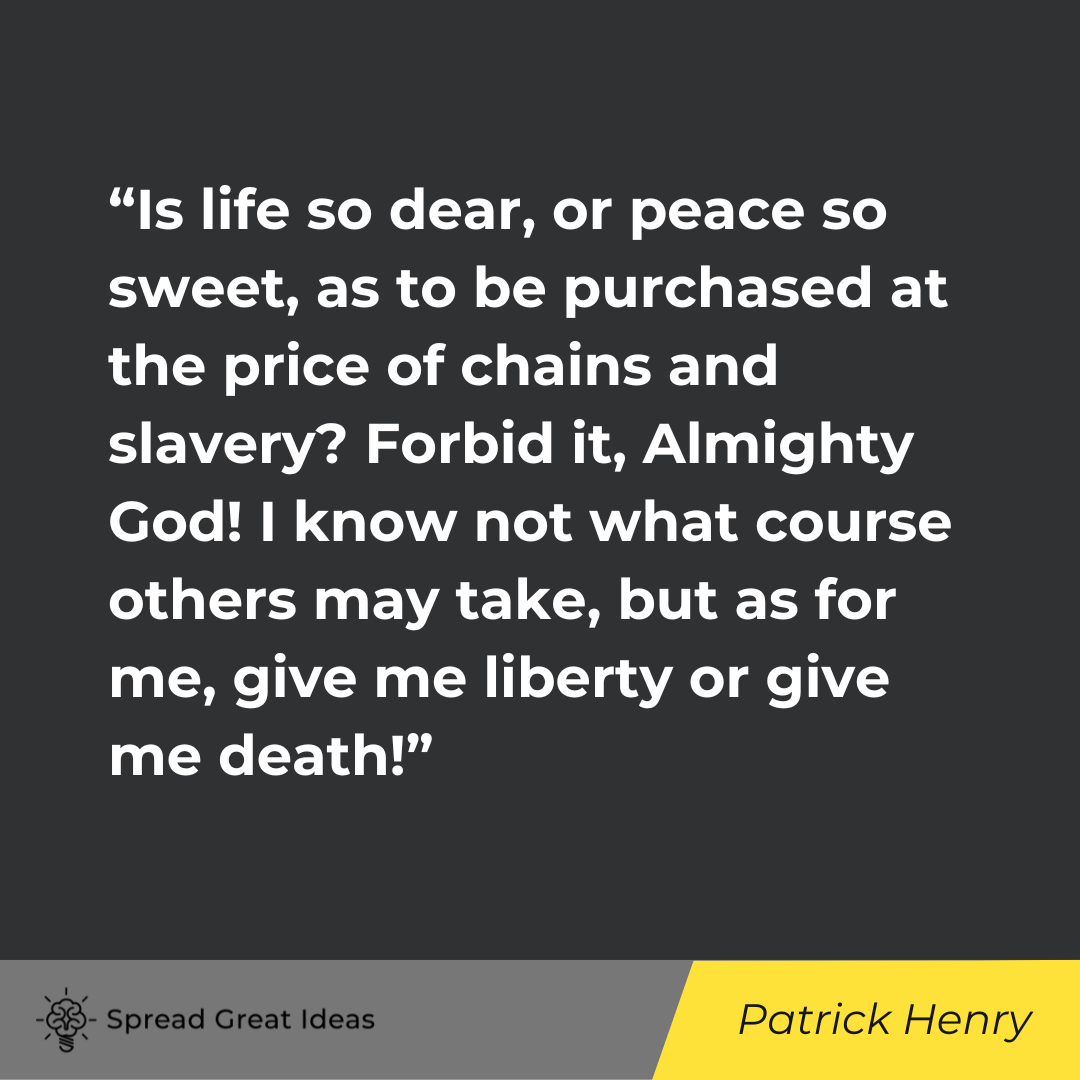
Patrick Henry’s quote powerfully articulates his unwavering commitment to freedom and self-determination. He questions the value of life and peace if they come at the cost of surrendering one’s liberty and autonomy. With fervent conviction, Henry declares his willingness to sacrifice everything, even life itself, in the pursuit of liberty. His impassioned plea to God underscores the gravity of his stance, as he adamantly refuses to accept subjugation or oppression. Henry’s words resonate as a timeless call to prioritize freedom above all else, inspiring generations to stand up for their rights and resist tyranny.
Sam Adams
“Our unalterable resolution should be to be free.”
– Sam Adams, to James Warren, 1776
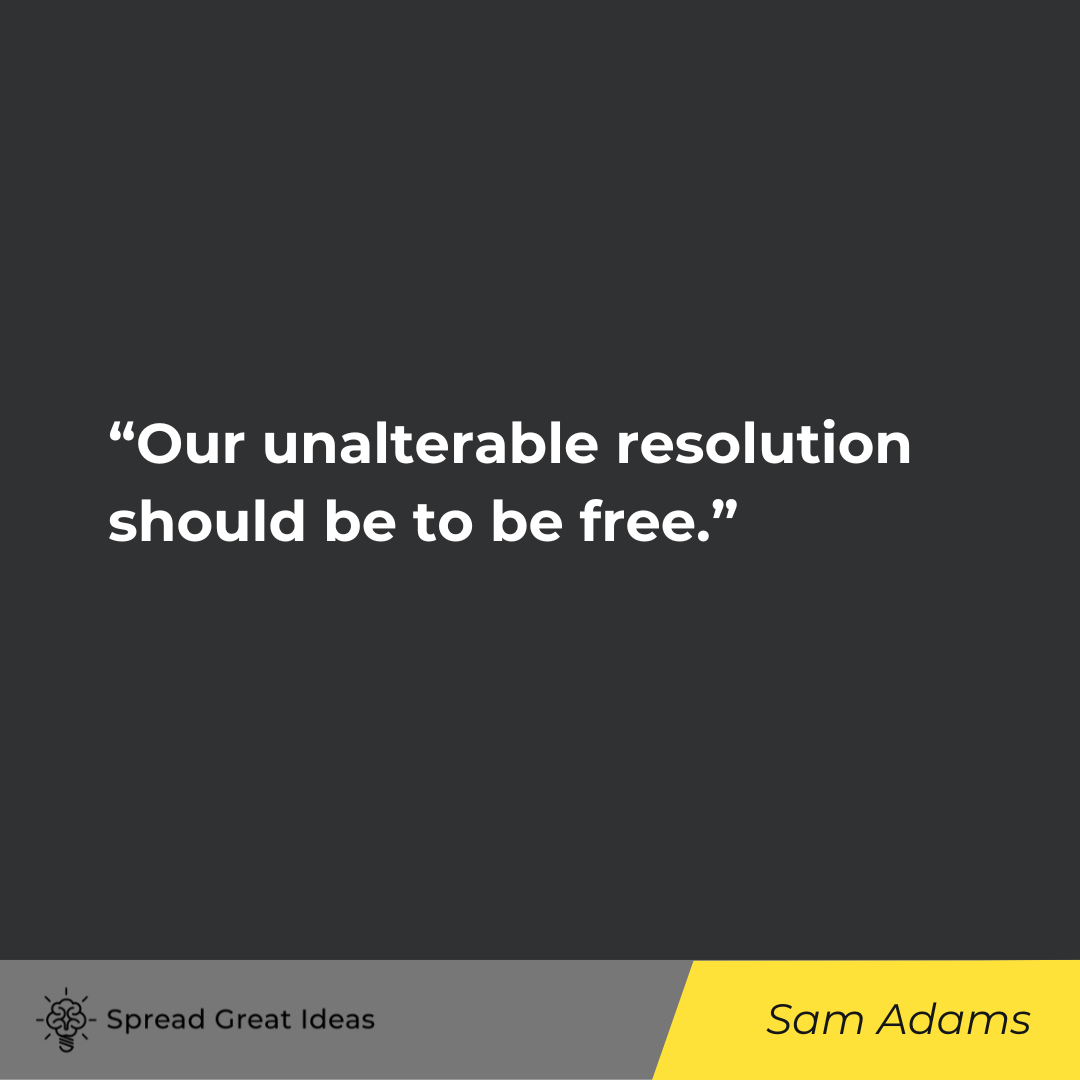
Sam Adams succinctly captures the essence of the American revolutionary spirit in this quote. With unwavering determination, he emphasizes the unequivocal commitment to freedom as the ultimate goal. Adams advocates for a steadfast resolve to pursue and safeguard liberty, highlighting its paramount importance in the face of oppression and tyranny. His words serve as a rallying cry for individuals to stand firm in their pursuit of freedom, echoing the sentiments that fueled the American Revolution.
Thomas Stephens Szasz
“Malcolm X and Edmund Burke shared an appreciation of this important insight, this painful truth — that the state wants men to be weak and timid, not strong and proud.”
– Thomas Stephen Szasz, Ceremonial Chemistry: The Ritual Persecution of Drugs, Addicts and Pushers
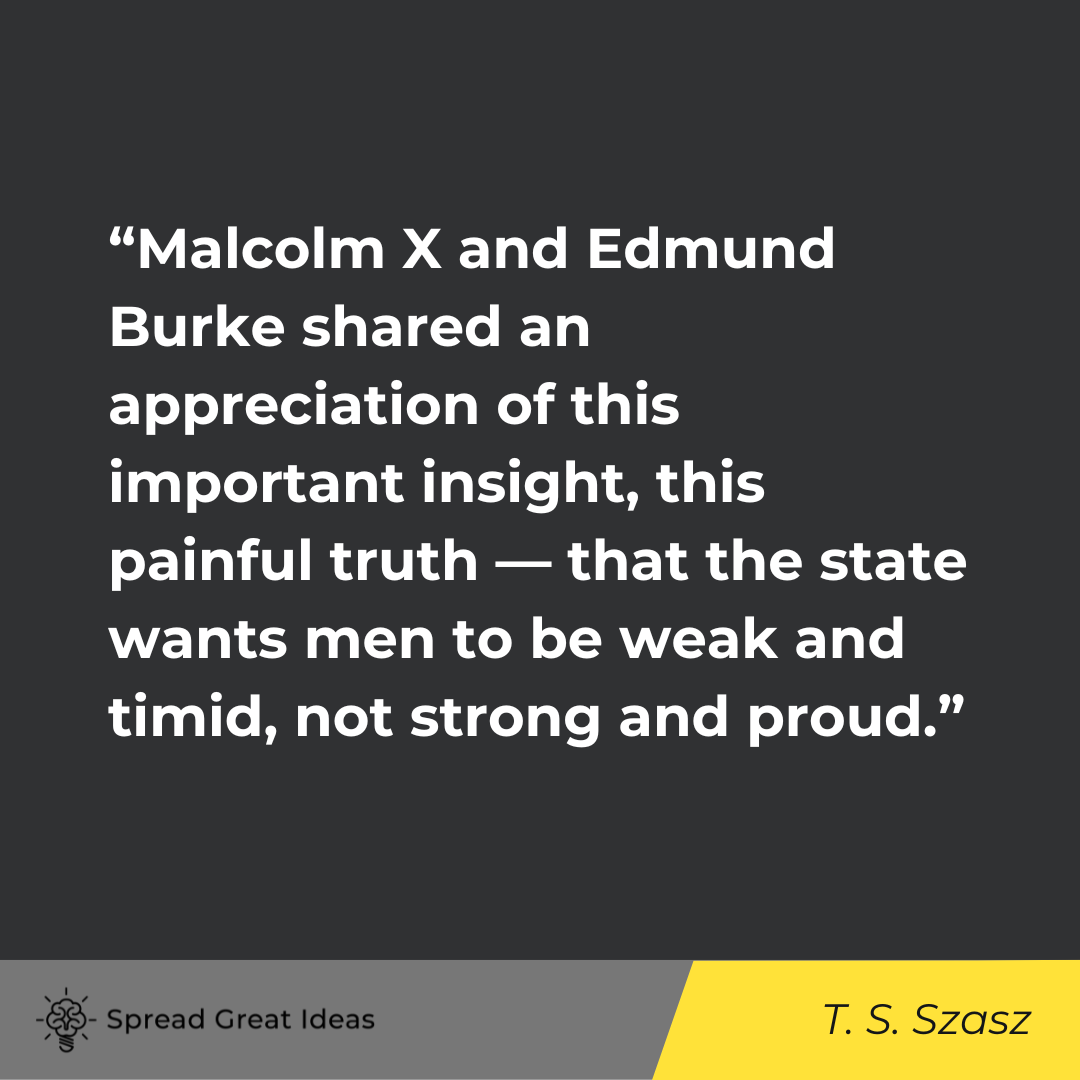
In this quote, Thomas Stephen Szasz draws a parallel between Malcolm X and Edmund Burke, suggesting that both recognized a shared realization: governments prefer citizens who are compliant and submissive rather than independent and assertive. Szasz implies that both figures understood the state’s desire to maintain control by discouraging individual strength and confidence. This observation underscores a critical aspect of state power dynamics and highlights the importance of personal empowerment in the face of systemic pressures.
Epictetus
“No person is free who is not master of himself.”
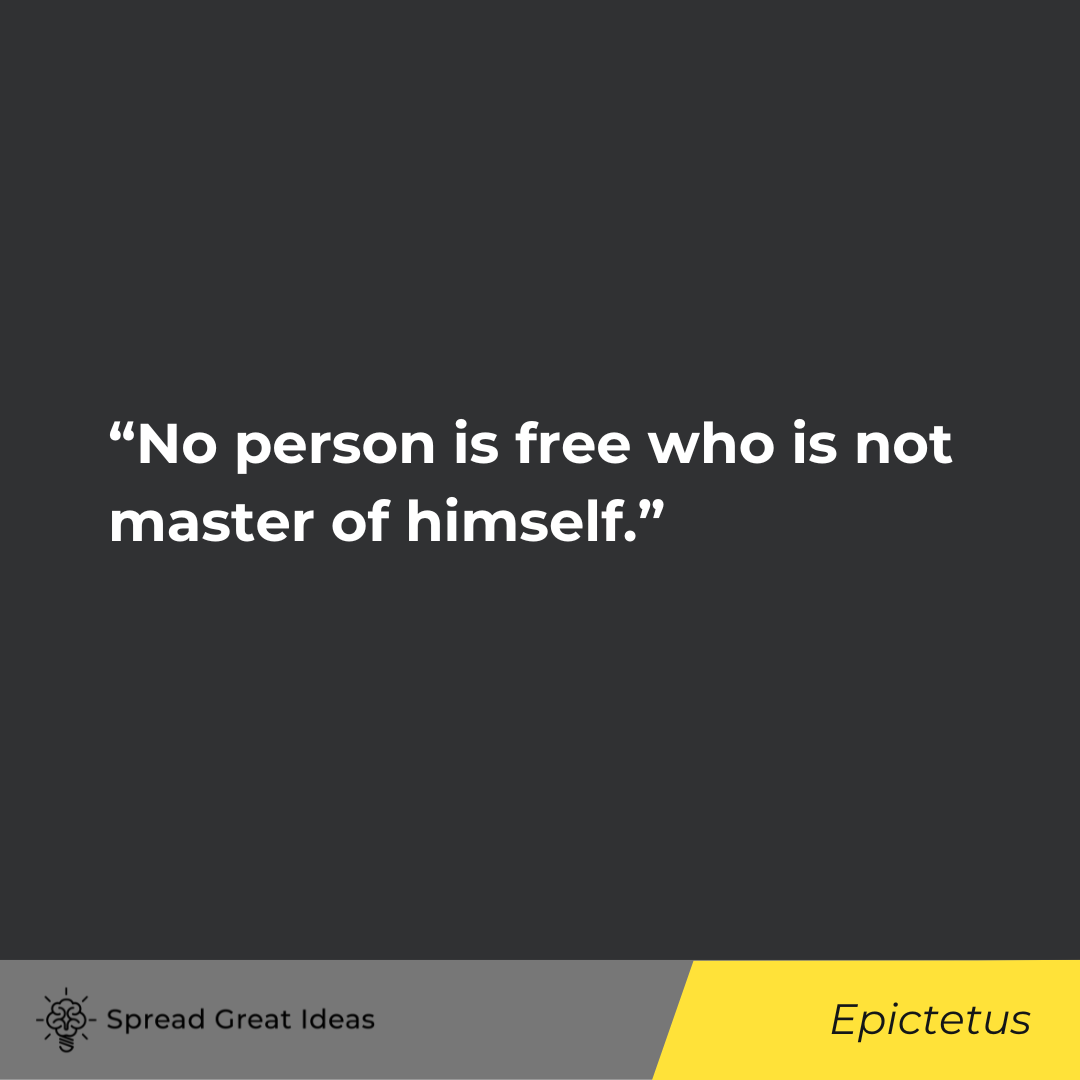
Epictetus succinctly captures the essence of personal freedom in this quote. He emphasizes that true freedom lies not in external circumstances but in mastering one’s own thoughts, actions, and emotions. By asserting that self-mastery is essential for genuine freedom, Epictetus highlights the importance of inner discipline and autonomy. This quote reflects Stoic philosophy’s emphasis on self-control and resilience, reminding individuals that their true liberation comes from within.
Bruce Lee
“True mastery transcends any particular art. It stems from mastery of oneself—the ability, developed through self-discipline, to be calm, fully aware, and completely in tune with oneself and the surroundings. Then, and only then, can a person know himself.”
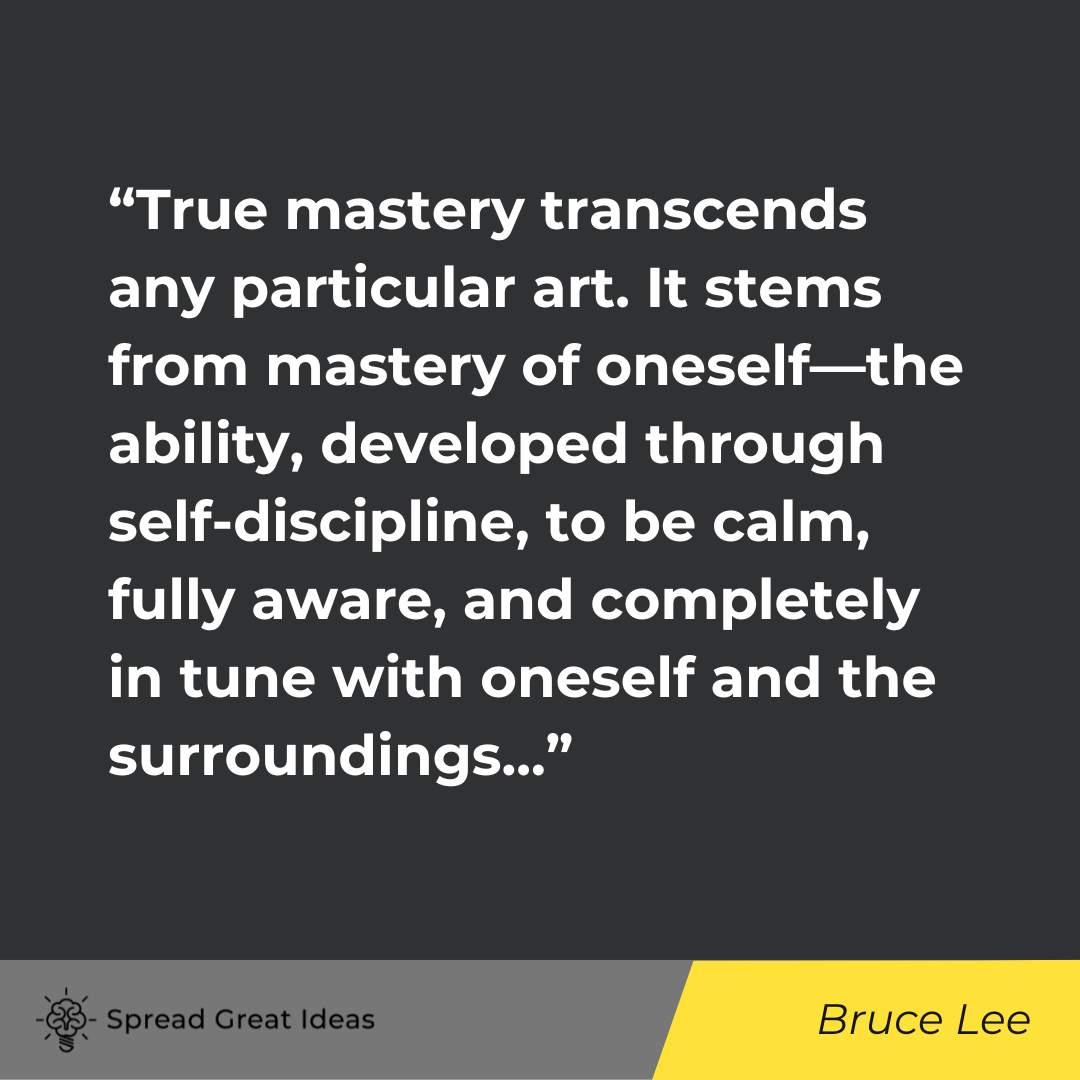
Bruce Lee articulates the profound concept of mastery in this quote, emphasizing that it extends beyond any specific skill or domain. He suggests that genuine mastery originates from self-mastery, which entails disciplined self-awareness and harmony with one’s inner and outer environment. Lee underscores the importance of inner balance and consciousness as prerequisites for understanding oneself fully. This quote reflects Lee’s holistic philosophy of personal development, emphasizing the interconnectedness of mind, body, and spirit in achieving true mastery.
Charlotte Brontë
“I am no bird; and no net ensnares me: I am a free human being with an independent will.”
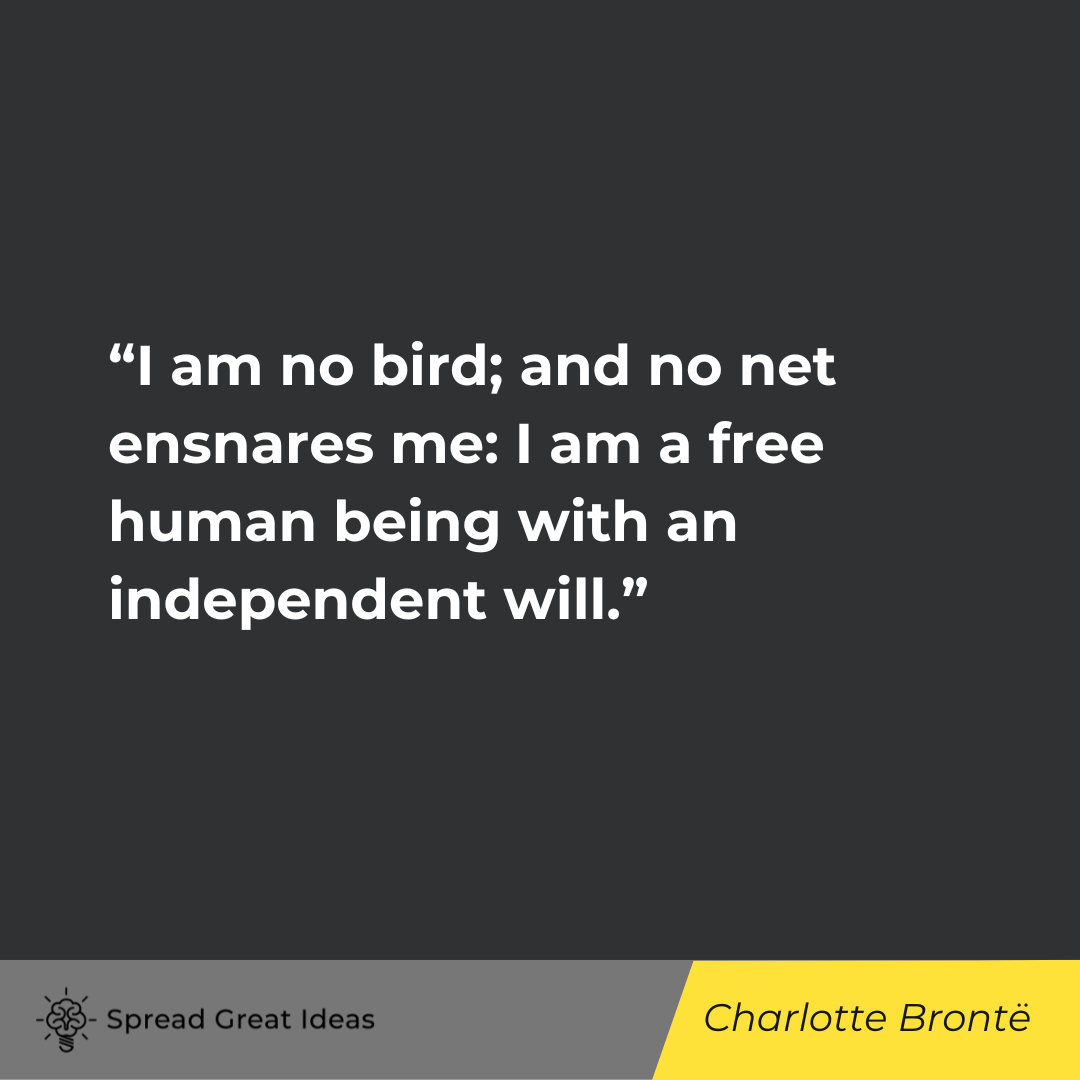
In this powerful declaration from “Jane Eyre,” Charlotte Brontë’s protagonist asserts her autonomy and strength of will. Jane refuses to be confined or controlled, likening herself to a free creature unbound by societal constraints. This quote encapsulates Jane’s defiance against limitations imposed by her circumstances, affirming her identity as an independent and resilient individual.
Jean-Jacques Rousseau
“Man is born free, and everywhere he is in chains.”
– Jean-Jacques Rousseau, The Social Contract
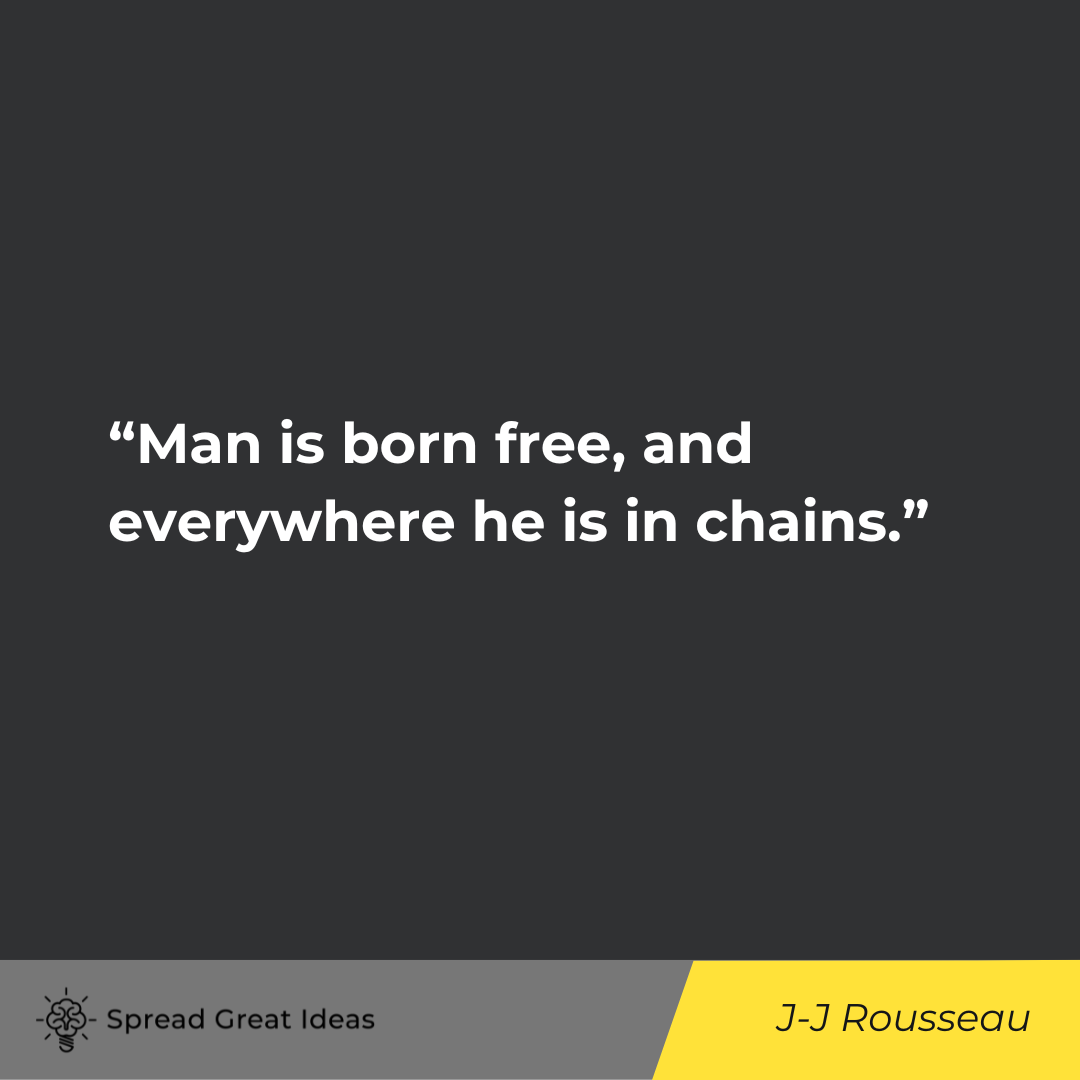
Rousseau’s quote succinctly encapsulates his view on the inherent freedom of humanity contrasted with the societal restrictions that bind individuals. It highlights the tension between the natural state of freedom at birth and the constraints imposed by society, suggesting that human beings are inherently free but are often constrained by social, political, and cultural structures.
